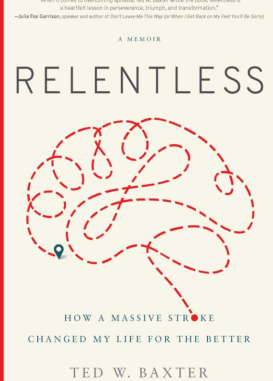
This is a book of voices. There are a multitude of elements making Ted Baxter’s Relentless, a memoir of surviving a major stroke and his subsequent determination to recover memorable, but the array of voices describing his journey from near death to triumph are the crucial element distinguishing it from similar accounts. It isn’t a work belaboring medical details or attempting to be inspirational in a hamfisted, sentimental way. Instead, it boasts an intense humanity evident from the first that pulls no punches and those aforementioned voices, Baxter’s own, his wife, family, co-workers and medical staff, bring his story to readers with an unsparing eye focused on relating the experience free from anything smacking of cliché.
URL: www.tedwbaxter.com/
Ted Baxter begins Relentless as an engaged, vibrant, and healthy man with a busy schedule and a thriving career in the financial sector. He travels often and enjoys the fruits of a cosmopolitan life resulting from his talents and professional discipline. He is lain low, like a bolt out of the blue, by a massive stroke that leaves him teetering on the edge of death and his wife forced to make life-altering, possibly life ending, decisions while dealing with considerable emotional distress. The book chronicles her torment in vivid detail, but doesn’t stop there. Relentless, likewise, documents the anguish his family and friends face in the aftermath of his stroke, but Baxter soon proves to be as tenacious in the face of a stroke as he has in his career and personal life.
TWITTER: twitter.com/tedwbaxter?lang=en
Baxter devotes the bulk of Relentless, however, to exploring his against the odds recovery and the obstacles he surmounts along the way. This necessitates the inclusion of some medical information to place his rehabilitation in its proper context, but the book thankfully never overwhelms readers with jargon and long-winding elucidations of his ailments. Instead, Relentless continues maintaining its focus on the humanity of his struggle and its effect on those in Baxter’s immediate orbit. Alternating between various perspectives gives readers a multi-dimensional view of this journey, but Baxter admits near the book’s beginning that many of his memories and recollections, especially early on, may not conform to the facts as he acknowledges the effects the immediate aftermath of the stroke exerted over his memory. His memories, nevertheless, possess the ring of authenticity and never strain credibility.
The voices driving this book frame the story in a conversational manner and the obvious intelligence and emotion rife in each “speaker” achieves coherence through their shared experience. This is not necessarily a given. A lesser book might have reduced this story to a mishmash of conflicting tones and overwrought histrionics, but there is an obvious effort in Relentless to present an unified, yet varied, account of the experience. These education shared by the men and women are obvious throughout the book’s entirety, but they are brimming with emotion and more than a little awe as they relate witnessing Baxter’s return from death’s door. Perhaps its greatest achievement is the multi-faceted and inspiring view it offers of that return. Relentless is one of the finest non-fiction books about the will to live and refusal to accept defeat I have read.
PURCHASE LINK: www.amazon.com/Relentless-Massive-Stroke-Changed-Better/dp/1626345201
Clay Burton
